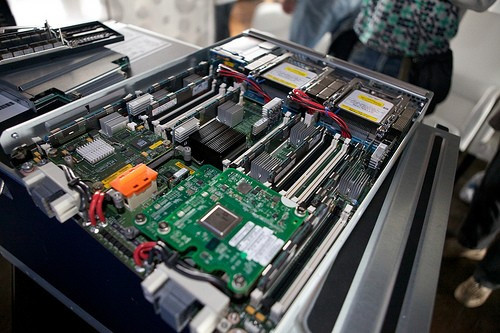HP, Battling Oracle, Moving to Newer Intel Chip

Hewlett-Packard, the No. 1 computer company, will phase out an older Intel chip on high-end servers in favor of a newer one. Besides offering more power, another goal could be to battle rival Oracle.
HP announced it will phase out the old Itanium microprocessor co-developed with Intel, the No. 1 semiconductor maker, to compete with advanced servers from the likes of Sun Microsystems and its SPARC technology about 15 years ago.
Both high-end chips sped computing power because they relied upon so-called Reduced Instruction Set Computing (or RISC) architecture. IBM is also a pioneer in the sector.
Oracle acquired Sun in January 2010 for about $5.6 billion, bringing the Redwood Shores, Calif.-based database software giant into the hardware sector for the first time. That put it into direct conflict against Palo Alto, Calif.-based HP. Sun continues to buy SPARC chips from Japan's Fujitsu, a long-time Sun licensee.
When HP announced fourth quarter results this week, it said revenue from sales of advanced Itanium-based servers dropped 23 percent. In an investor call, CFO Cathie Lesjak said HP's ability to close deals had been impacted by Oracle, which announced it wouldn't develop new software for Itanium.
In what looks like retaliation, HP this week announced its Odyssey project which will unify both the RISC-based chips as well as older-model x86-based chips from Intel as well as Advanced Micro Devices built into millions of PCs and servers. Intel is based in Santa Clara, Calif., while AMD is based in Sunnyvale, Calif.
HP announced it will move to Intel's newer-model Xeon processors when it introduces new versions of its Integrity servers, NonStop systems and forthcoming Superdome 2 and c-Class blade enclosures.
The company also said it will keep working with software partners Microsoft as well as open-source specialist Red Hat Software on the new technology.
HP plans to transform the server landscape for mission-critical computing, said SR VP Martin Fink, general manager for business critical systems.
HP, which previously sued Oracle for failing to support Itanium, may show some new servers at a showcase in Vienna next week.
Meanwhile, Oracle has been shipping Sun's high-end servers as well as its own Xeon-based products including the Exadata Database Machine X2-2 and X2-8 and Exalogic Elastic Cloud.
Oracle hasn't issued a comment on the HP decision.
Shares of Oracle fell about 2 percent to $29.17, while HP shares fell about 3.4 percent to $25.74 in Wednesday trading. Intel shares were off 2 percent at $22.75.
© Copyright IBTimes 2025. All rights reserved.





















